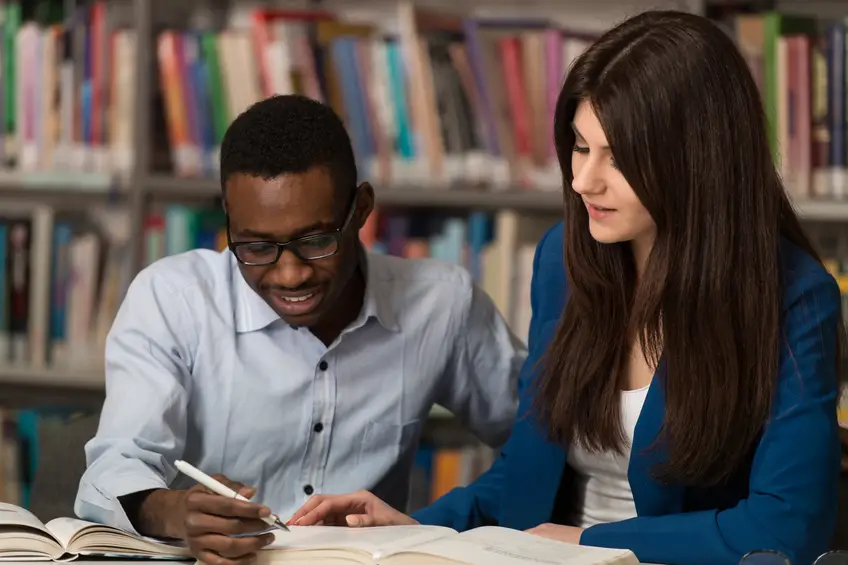Study Abroad at Home
Ironically, I was the one who was supposed to be teaching.
By Mattie Winowitch, Waynesburg University
This past semester, I decided I would step out of my comfort zone and try my hand at tutoring.
While I’m definitely no Education major, I feel as though I have a knack for explaining things, especially when those things come naturally to me. However, when the tutoring coordinator at my school contacted me saying a foreign exchange student needed assistance, I didn’t know what to think.
Here’s a bit of my background: I come from a very small public high school that probably had a 5 percent black population, with the rest being annoying white kids who were either preppy or faux-country. To this day, I still don’t know how I survived that shit. Then, I went from that hellhole directly into another predominantly white, small, Christian college. So, a lot of white people and not a whole lot of anything else.
Taking all of this into consideration, I’d never had prior personal experience with a foreign student. While I was apprehensive, the coordinator calmed my fears, saying that exchange students are often very intelligent and that tutoring her would be no problem. Plus, the class she needed help in was a newswriting class, so, the journalism side of me had it covered.
I accepted this daunting task, and in hindsight, I’m so glad I did.

My tutee is a girl from South Korea, and she is the sweetest thing on two legs. While I was scared to accept the position as her tutor at first, now I look forward to meeting with Katie (which is her American name) every week. That is why I am urging everyone—even the skeptics—to work with a foreign exchange student at least once in their life. While you attempt to teach them, you’ll learn life lessons that will last forever.
One of the first things you could learn from tutoring an exchange student is how terrible Americans can be. Katie told me horror stories of her being picked on or misunderstood by professors or fellow students on campus. They’d think she was weird or laugh if she would misunderstand. I’d like to think I’ve never been horrible to someone who had been traveling or studying abroad in America, but I know not everyone shares my compassion.
In light of a few recent events, such as the inauguration of President Trump, racism seems to be at an all-time high in our country. Or, well, at least more common. There are many white Americans who hate people like Katie for no reason other than the fact that they’re foreign. To me, especially after working first-hand with her, this sickens me. If every English-speaking white American was forced to tutor a foreign student, I’m sure the U.S. would be a much better place.
I also learned that traveling abroad is a valuable experience. I have experience traveling abroad myself, so I know what culture shock and being immersed in a country where you don’t speak the native language feels like. Sure, I was only abroad for two weeks, but those two weeks changed my life forever. They also helped better prepare me to work with Katie.
Because I had my experiences abroad, I was better able to empathize with Katie’s experience and try to put myself in her shoes for things that confused her or caused her stress. Even if you can’t get the chance to tutor a foreign student, you can learn a lot about other cultures and understand them better after studying abroad.
Not only did I learn the value of travelling abroad after working with a foreign exchange student, but I also learned the value of learning a foreign language. Katie’s first language is not English. As a result, during our tutoring sessions, I would help her write articles and professional e-mails to professors and sources. This sort of help is very common for any type of tutoring service, no matter if you require a law tutor or a tutor in math.
While Katie struggled with some of her sentence structures and grammar, I was able to put on my thinking cap to help her with a lot of the basics. This not only helped me refresh some of my grammar skills as an English speaker, but it also helped Katie absorb so many new aspects of her second language.
It then became clear to me that by learning a second or third language, one could only become stronger in their native tongue.
After taking five years of Spanish in high school, I still remember specific parts of speech and tenses that I otherwise wouldn’t have remembered since elementary school. That goes to show that by picking up a new language, you can not only further help foreign students.
One final thing you might learn from tutoring a foreign exchange student is how patient you really are. As I previously mentioned, Katie’s first language isn’t English. While her English is impeccable, sometimes there are language gaps that make communicating difficult. However, instead of getting frustrated and wanting to throw in the towel, I was very slow and tried to clarify as best I could in a way that didn’t seem rude or insulting of her intelligence.
Sometimes Katie asks questions that to me seem very simple and obvious. Other times, she would go to type a paragraph and it would take her forever, as I am normally used to speedily tapping my fingers along the keyboard. As a controlling, Type-A person, this nearly drove me insane.
I have to say patience isn’t an automatic ability, but, instead, it’s a muscle that must be worked on and strengthened over time. By removing my cultural frame of reference, or the “rose-tinted glasses” that I’ve acquired from being raised in America, I was able to take a step back and really try to understand the problem at hand.
If you label yourself as an impatient person, working with someone from a foreign country could help you get past that barrier. It is a very similar sensation to working with a young child. They are new to your world, and as their tutor, you must show them the way.

















